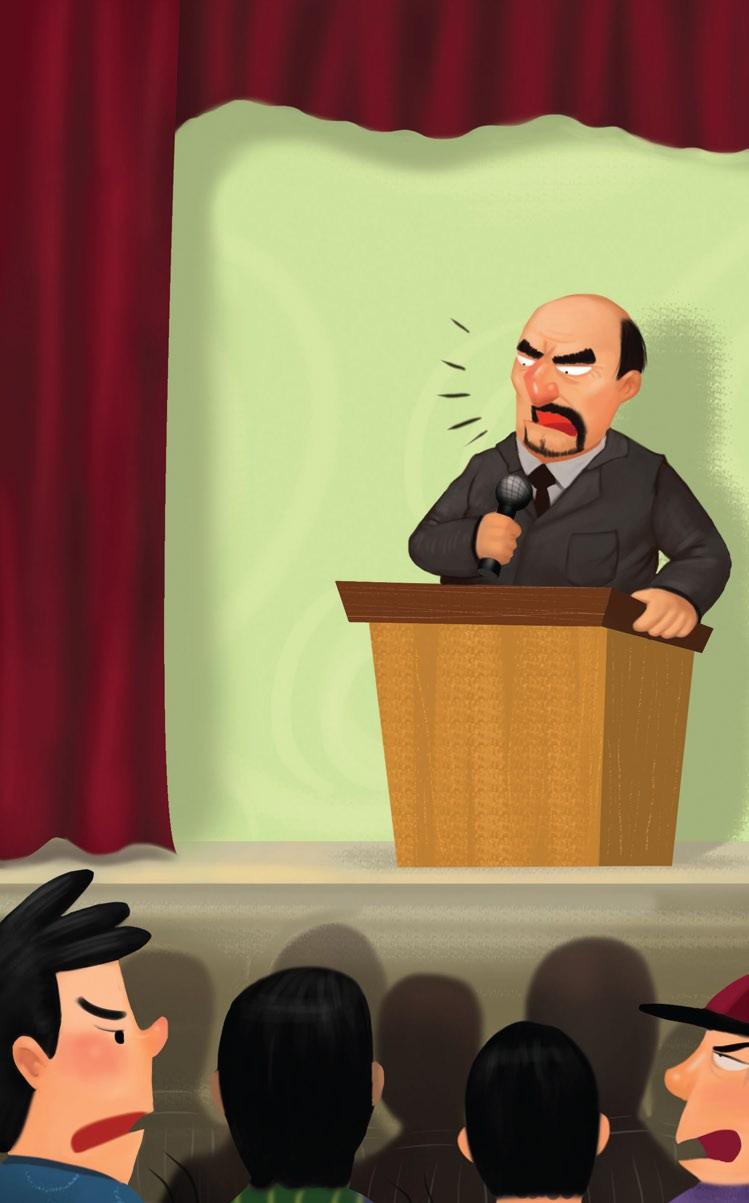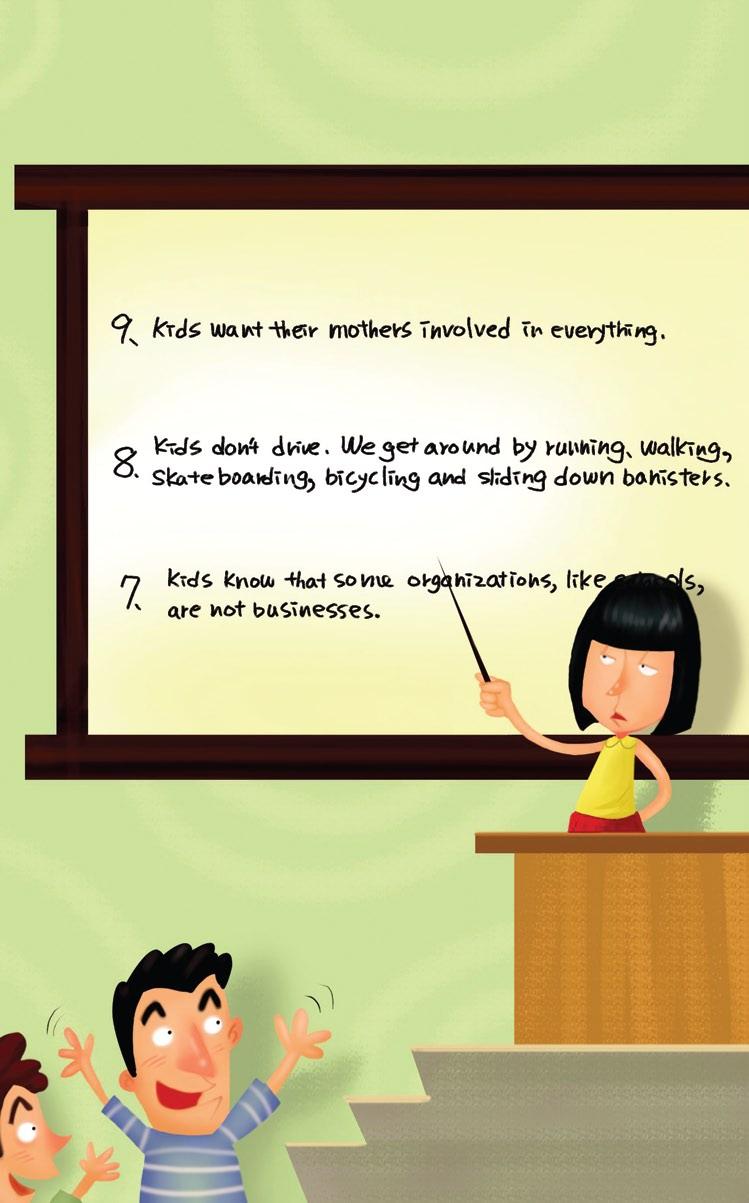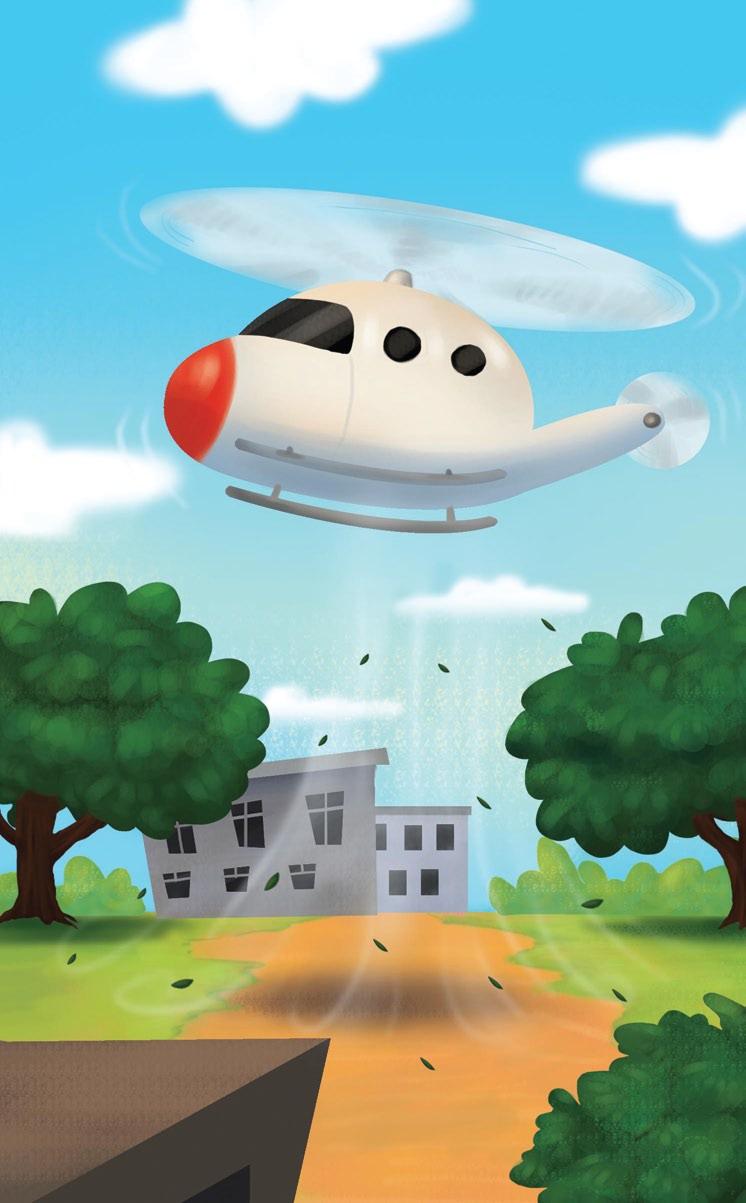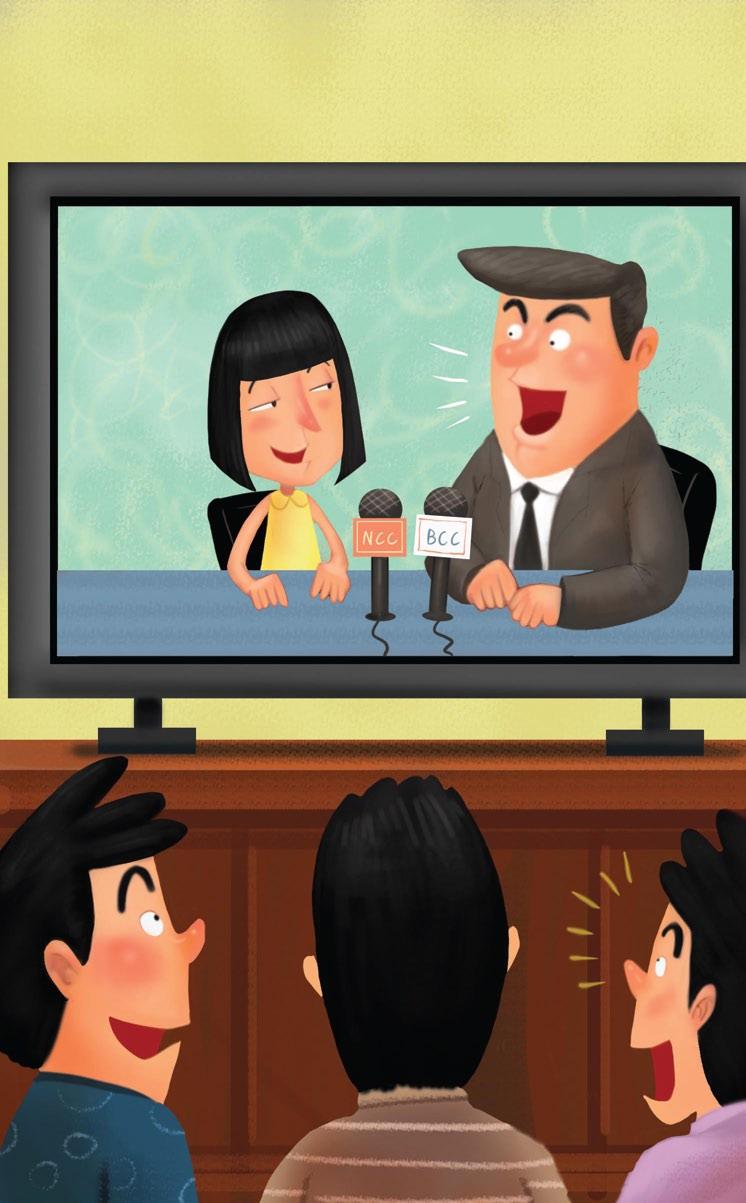May Moon Rescues the World Economy

May Moon Rescues the World Economy
Paperback
ISBN: 978-962-7466-17-8
Text and illustrations © 2010
The Hong Kong Institute of Certified Public Accountants
www.hkicpa.org.hk
First printing 2010
Second printing 2011
Third printing 2011
Fourth printing 2013
Fifth printing 2014
All rights reserved. No part of this book may be reproduced in any form or by any electronic means, including information storage and retrieval systems, without permission in writing from the publisher, except by a reviewer who may quote brief passages in a review. The right of Nury Vittachi to be identified as the Author of this Work has been asserted, as have his moral rights with respect to the Work.
Dear readers,
We are very excited about bringing this new book to you following our first, May Moon and the Secrets of the CPAs.
Welcome to another adventure with May Moon, a young financial wizard who shares her gifts with other young readers through her books.
In her first book May taught young people why money is important, but not too important. She learns all her secrets from CPAs, which stands for “certified public accountants.” CPAs are people who take care of money and economic matters.
In this book, May figures out how to save the world economy by talking to certified public accountants AND their children.
The economy is a funny thing—sometimes it’s good and we all have jobs and money to spend. Sometimes it’s not so good and jobs are hard to find and money is short. You will experience both during your life. May does her best to explain this to you and make suggestions only young people like you can imagine.
May Moon was created by Nury Vittachi, who also goes by the name of Sam Jam. He is a talented and famous writer, who writes for grown-ups as well as children.
Hope you’ll enjoy this book as much as the first one.
If you have questions about the economy, May will be glad to help you. Write to Sam Jam at sam@jam100.com or the Hong Kong Institute of CPAs at hkicpa@hkicpa.org.hk.
Sincere regards,
Hong Kong Institute of CPAs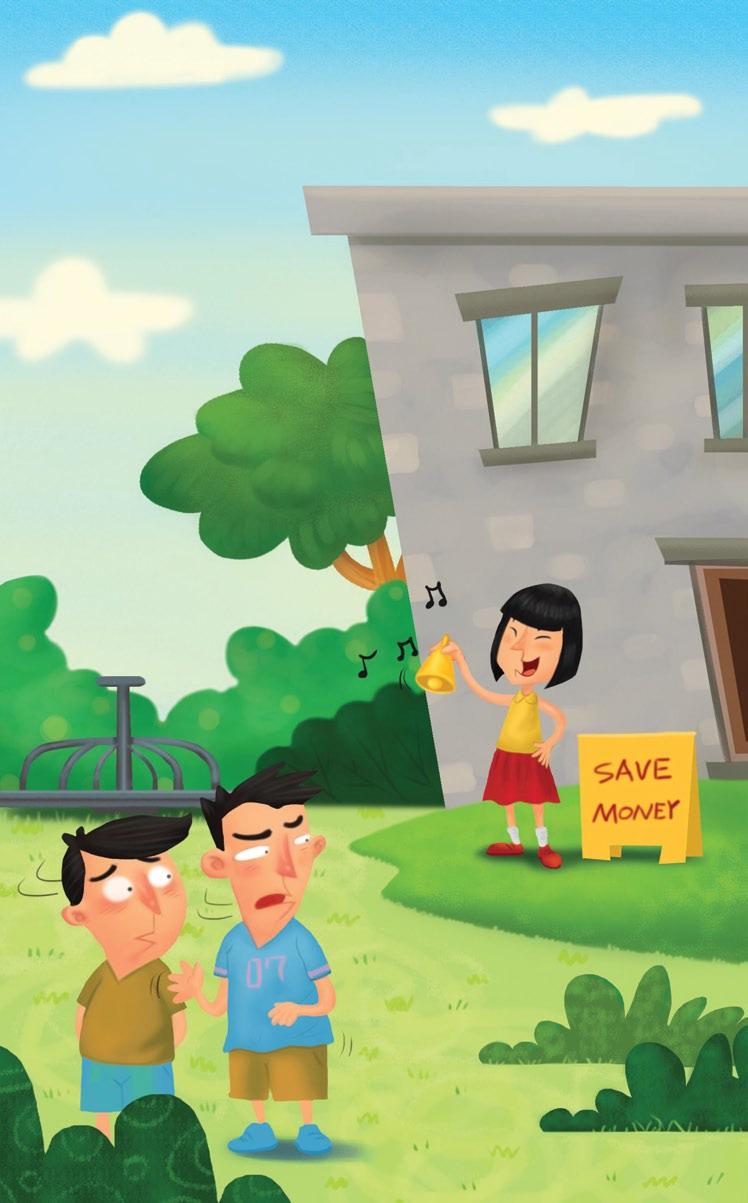
Chapter One
It was a warm, breezy morning in late summer. Soft, salty winds blew in from the sea.
In the grounds of a small but noisy school, May Moon picked up a brass handbell and shook it. Its metallic ding-ding-ding sound carried across the playground.
“The office is open,” she called out. “Clients should queue up in an orderly line to receive free advice.”
Several children turned to look in her direction.
But to her surprise, they instantly returned to their conversations. No one smiled. No one spoke to her. No one approached.
She swung the bell more energetically and called out again. “The pocket money advice bureau is open. First come, first served.”
This time, nobody even turned to look. It was as if she had become invisible.
Grrr! The space between May Moon’s eyebrows wrinkled up into a little grid. But then she realized that it would be smarter to be puzzled than cross. The free financial advice service she ran was normally very popular. That was because she gave advice that really worked. She knew from experience that talking through a problem took you halfway to fixing it, and learning not to worry about it took you a lot of the rest of the way.
But she wouldn’t be solving problems today. For the first time since she started two weeks ago, there were no clients.
Maybe all the kids at school have solved their pocket money problems, she thought. Bother!
If this was true, it was good news for the children,
but bad for May. She had only been at the school for a fortnight, and still hadn’t made any real friends. Setting up the advice station at the morning break had been a good way to get talking to the other children.
But could all the kids really have solved their own problems? It seemed unlikely. She knew that new problems tended to arrive as old ones were being solved: Life was like that.
Casting her eyes around, she noticed that the whole corner of the playground where she stood was empty. Was there some reason why people were staying away? Surely it wasn’t because she was there?
Her brow wrinkled. This was seriously annoying.
From a distance, she watched the children play. The younger ones ran around shouting and laughing and chasing each other. The older ones stood around talking.
Then one girl standing in a group of four children turned and looked in her direction. It wasn’t a normal glance: it was a hostile stare. May gulped. Uh-oh.
From a different quarter of the playground, she noticed some boys glaring in her direction too. Their eyes were narrow and unfriendly.
I must have done something really bad, she thought. She removed the “How to Make Your Pocket Money Grow” banner from the table and tucked it into her bag, which she slung over her shoulder. Then she pushed the chair under the desk and quietly left the playground, heading to a place she knew would be a good refuge.
Chapter Two
Two minutes later, May stepped into the school library. She loved this large, colourful room. It was quiet and comforting, it was beautifully decorated, with posters on the walls, and lots of chairs and cushions, but most of all, she knew that libraries were magic portals. You can step into a library, pick up a book and be transported to another country or another time or another planet. She also knew it was the best place to find answers to questions that troubled her.
Normally, she headed straight to the shelves to choose a book. But this time, she realized she needed to sit and think, so she pulled up a chair and sat at a table, elbows on the surface, chin in her palms.
She needed to work out what was going on. Why were the other children avoiding her today? Had she done something bad by accident? Or said something terrible without realizing it? It was so unfair! She felt very grumpy.
“Looking for a good read?” The friendly voice came from Mrs. Luck, the librarian, who was peering at the girl over her reading glasses.
“No. I haven’t finished the books I borrowed yesterday.”
“Oh, so have you just come in for a bit of peace then, May?”
“Yes. I guess so. No one seems to want my advice today.”
The librarian gave her a sympathetic smile. “Never mind,” she said. “I wouldn’t let it worry you. Why don’t you start a new book anyway?”
“Maybe it’s just that no one has any problems today,”
May said, thinking out loud. But she didn’t add the dark thought in the back of her mind: It was clear that there was at least one kid with a big problem—herself.
As if she could read her mind, the librarian said: “Don’t worry about it, May. The whole town is going through a difficult time just now. The economy’s bad. All the adults are stressed. And that stress gets passed on to the children.”
May knew what Mrs. Luck was talking about. The grown-ups in town had been SO gloomy lately. Although she knew more about saving money than most kids, she didn’t understand the complicated world of economics, which she knew was something about how money and things moved from place to place and person to person.
“I wish I understood all that stuff,” she said. The librarian lowered the book she was reading. “May, you already know more about money than all the kids here, and probably many of the adults.”
“Yes, but I only know about pocket money and savings and stuff. The news reports on TV keep talking about stock market crashes and financial downturns and that sort of thing. I don’t really get all that.”
Mrs. Luck nodded sympathetically.
“It IS complicated.”
From hearing grown-ups talk to each other, May knew that young adults were finding it hard to get jobs, and many older ones had lost theirs. Even grown-ups who had kept their jobs, such as her mother, were depressed.
Mrs. Luck, a tall woman who wore colourful clothes and bright scarves, walked over to where May was sitting and held out a book.
“Have a look at this,” she said. “It’s rather odd, but it might be just what you need. I have no idea where it
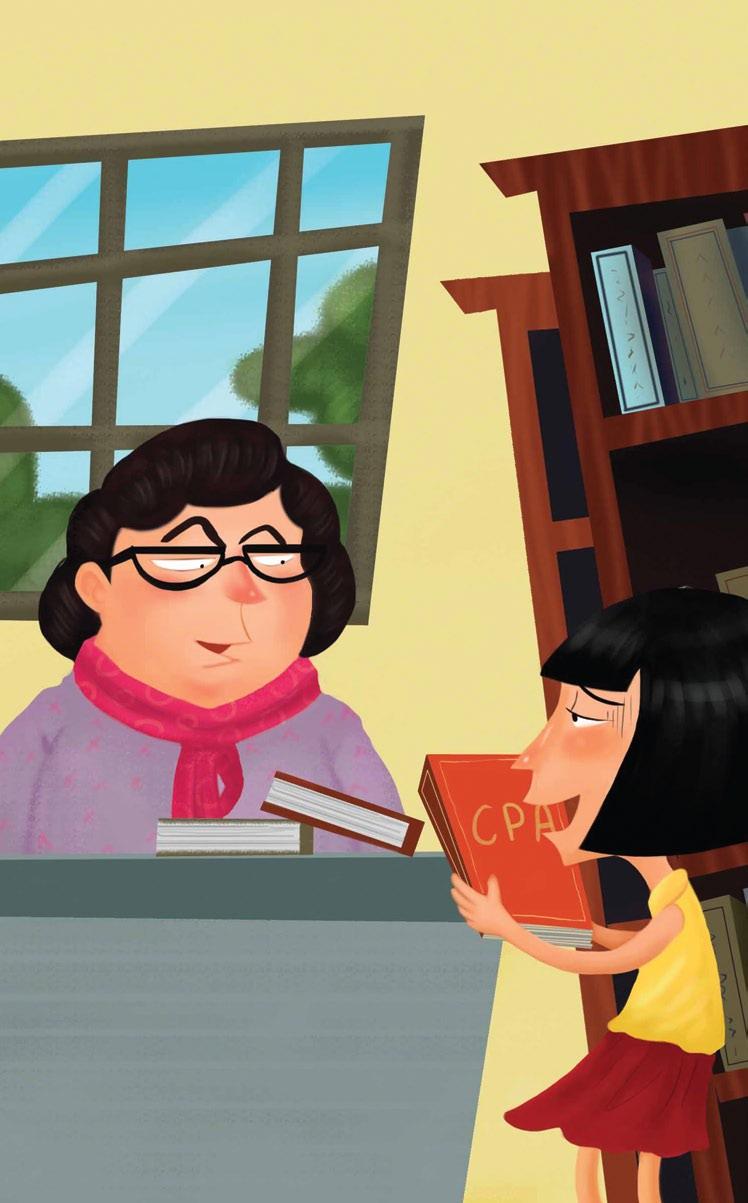
came from. It’s not in my catalogue or any of the library book lists. It seemed to have just appeared on the shelf by magic.”
The librarian’s words sent a shiver of excitement through May’s body. Could it be? Could it possibly be?
Catching her breath, she raised her eyes and was delighted to see a volume that had a strange resemblance to a book she had read called The Secrets of the CPAs.
“As I say, it just seemed to appear,” said Mrs. Luck. “But it seems to be about economics, and it explains it all very simply and clearly.”
May’s eyes were as big as saucers as she took the book from Mrs. Luck and said a silent prayer that it would solve whatever was wrong with the village—and particularly that it would cheer people up, especially her mother.
“I’ve seen a book like this before,” May said excitedly. “I’ve read one like it. This may be the sequel.”
She held the volume in her hands, saving up for the moment when she would actually open it.
Mrs. Moon had started life as an accountant. Some people joked about accountants being boring people, but May’s mother and her colleagues had always had fascinating jobs, helping all sorts of people, from shopkeepers to train drivers to TV stars. For the past year Mrs. Moon had been boss of Village Bank, one of the most important jobs in the village. But the recent money problems in town had meant that she worked long hours and often came home looking worried.
May opened the book and flipped through the pages, hoping fervently this book held the secrets of the accountants and it would help her and her mother.
It was the same, but different: It seemed to be a sequel, as she had thought. Like the edition she had
read a while earlier, there were lots of short, interesting articles, each introduced by a different person.
While the previous book had opened with an article by a man named Contents Page, this one began with a picture of a young man who looked a little older than May herself. He seemed to be in his teens, and the caption said that his name was Turner.
May remembered how the earlier book had seemed to come alive, with Mr. Page and his team talking to her. She wondered if this sequel would do the same.
She flipped back to the first page and started reading.
INTRODUCTION by CPA-Kid Turner
Thanks for picking up this book. We hope you will enjoy it and learn from it.
My name is Turner Page and I will be your host this time. Mr. Page and his team of accountants, who wrote the previous volume, are extremely busy right now. They are working hard on dealing with the world’s major economic problems, so they are not available.
May bit her bottom lip. Bother, she said to herself. She might have guessed. Compared to the worldwide problems that Mr. Page and his team of top accountants were working on, her problems hardly counted as important.
What a shame. She would have liked to see Mr. Page again, and was confident that he could have helped her.
This new host, the young man, looked friendly and polite, but he was just a kid, like she was. How could he help? She read on.
I know I’m just a kid. But I think my team and I WILL be able to help you.
I am the son of Mr. Page, and the writers of the articles in
the rest of the book are the children of the magic accountants who helped you last time you know, the ones from the other book, The Secrets of the CPAs.
May was amazed to read these words. This book definitely seemed to be magic, considering the way it spoke to her as if it was a personal message to her.
Yet she remained a bit disappointed that she was dealing with other children. Money was a complicated, difficult thing to deal with. She knew her mother had trained for years to become qualified as an accountant, and win the right to have the letters CPA after her name. And she knew that even now, her mother went to regular top-up courses, despite being the top executive of a bank, which is one of the most important jobs a successful accountant can have.
How could kids know the same stuff or be able to sort out big economic problems? Surely it was impossible. Still, what other sources of help were there? None at all.
May read on.
Hey, don’t dismiss us without giving us a chance! You could be surprised. In some ways, we may actually be able to do a better job than our parents.
They have training as money experts, that’s true. But these days, people know the most important thing is fresh, innovative thinking. And that’s hard for some grown-ups to do because they work all the time and don’t play games.
But kids use THOSE parts of their brains all the time.
If anyone’s going to come up with truly creative ideas, it’s going to be us.
And as for gathering and exploring all the information that we need to operate like proper financial experts, well,
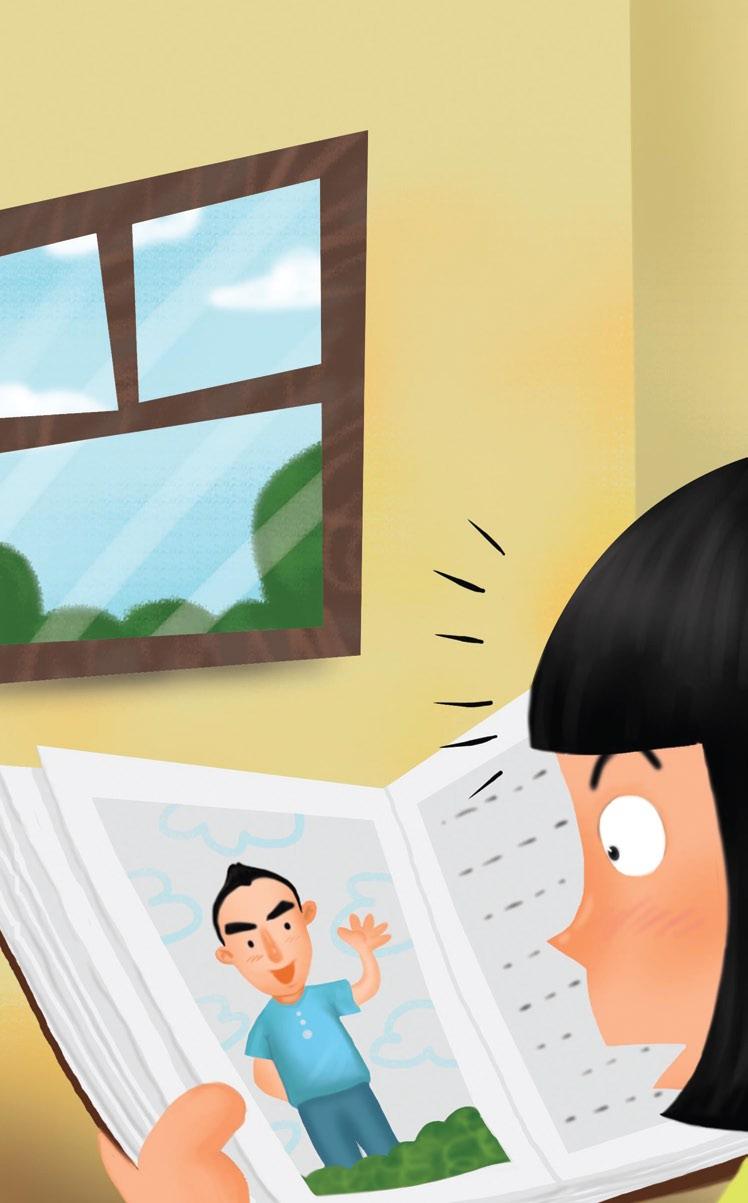
studying is what kids do and kids are good at learning. So let’s learn about the economy.
Fair point, May thought to herself. Okay, she might as well give them a chance. She flipped to the first chapter after the introduction and started reading.
THE ORIGIN OF TRADE by CPA-Kid Eric
Have you ever heard of “cave men”?
Early humans didn’t really live in caves. They didn’t live anywhere in particular. They were nomadic. That means they travelled often, collecting fruit and vegetables to eat. From time to time they caught animals to add a bit of meat to their diet.
But then one day a group decided to stay in one place and grow food to eat instead of looking for things. It turned out to be a good idea. There was lots to eat, and life was easier. This idea spread.
After a while, each group found it had its own specialties. One turned out to be good at growing wheat, while another harvested berries, yet another caught fish, and so on. They discovered what we now call specialization.
Each would swap their extra crops with the extra items of other groups, so that everybody ended up with many different things to eat. This was the beginning of trade.
Since everyone ended up with a better variety of food and other things, life improved for everybody. This is what we call economic development.
May smiled. The book was interesting and clever, yet explained complicated things simply, just like the first book.
That one had been all about personal finances, how each person could look after their own money. But this
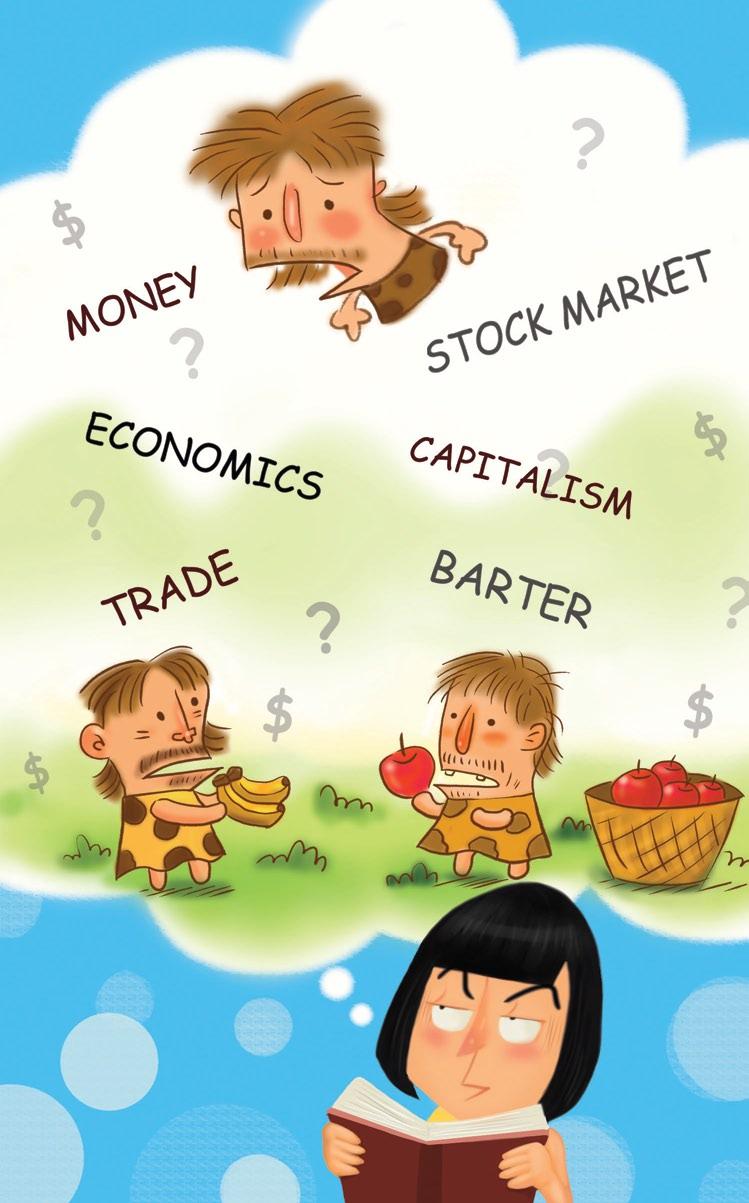
one was about much bigger concepts—and it might just give her the information she needed to help people with the problems caused by the bad economy. She turned to the next section and read on.
THE GROWTH OF TRADE by CPA-Kid Melanie
For hundreds of years, trade happened mainly between neighbouring villages.
Food would rot if you transported it too far. But there were a few things that did not go bad and could be traded at longer distances, such as carvings, salt, tools, pots and so on.
People did not want to carry everything they grew or made with them all the time, as it was too heavy. This problem was solved when money was invented. Coins and banknotes were really just tokens of the value of goods, and represented food, tools, cows, or even services, like shoe-mending or fortunetelling.
So both goods and money started to move around. This system worked well for centuries. In recent years, as high speed, refrigerated transport became available, people were soon trading everything, including food, with others all around the globe. There were lots of interesting things to be learned from watching how people traded with each other, and what benefits came to groups on all sides of the deals that were made.
The way money and items of value moved around was called the economy. And people who studied it were called economists
May’s reading was interrupted when she heard the library door swing open behind her. Alisha and Michael, two children from her class, walked in.
But they walked right past without a word and went to sit at the furthest desk away.
Irritated by this, May rose and went to the librarian’s desk. “Can I borrow this book?”
“Well, I haven’t catalogued it yet,” said Mrs. Luck. “Can you take it out tomorrow?”
“Please please please please please. This is exactly what I need right now. I think this can help my mom.”
“Okay. Take it. Bring it back next Monday. But don’t tell anyone I let you have it,” she said. “I normally never give out books without cataloguing them.”
“I won’t tell.”
“And look after it. It looks valuable.”
“Oh, it is,” said May. “It’s very valuable indeed.”
The bell rang for the end of morning playtime and May ran to her classroom holding the book tightly to her chest.
Chapter Three
That evening, the sky filled itself with thick clouds, and darkness fell quickly as the end of the day approached.
May was expecting to spend a quiet evening at home by herself. Her father, the principal, was away for the week at an education conference, and her mother normally spent Monday nights at a book club with other moms.
But the door clicked open at seven o’clock and her mother came in.
“No book club tonight, Mom?” May asked.
“I’ve decided not to go,” said Mrs. Moon, managing a tired smile. “It’ll be nice to spend the evening with you.”
May decided that she needed to find out exactly what was making all the grown-ups upset. “I’ve been reading about the economy today, Mom. There’s something wrong with it, isn’t there? Everyone seems upset.”
“Yes, the economy is terrible right now, but the bad times won’t last forever. And it isn’t something that children should concern themselves with, in any case.”
“That might not be true,” said May. “Things have been weird at school.”
Her mother was immediately concerned. She slipped off her shoes and came to sit next to her daughter on the sofa.
The girl told her mother that children at school seemed to be avoiding her, and she was getting strange, cross looks from people she barely knew.
Mrs. Moon frowned and bit her bottom lip. “I hoped that wouldn’t happen. But I was worried that it might.”
“Why would anyone be cross with me?”
“It’s complicated, but I’ll tell you the full story. You know what the economy is, don’t you? The way that money moves around?”
“I do,” said May. “I got a special book from the school library about it today.”
“That’s great. Well, from time to time, there are economic slumps, which is when the amount of money moving around goes way down. That means everyone has to scale down their plans, some people lose their jobs, everyone has less to spend and so on.”
“But how could that affect a kid?” May asked.
“It affects everyone, especially in a place like this. This is a new town, so all the houses were built recently, and the shops and other businesses here have only been going for a little while.”
“I like living in a new town,” May interrupted. “New towns have bicycle paths and playgrounds and canals and things.”
Mrs. Moon nodded. “There are LOTS of good things about new towns. But there are tricky things as well. It costs a lot of money to buy new houses, and it takes a lot of money to set up stores and offices and farms. All the money that makes those things happen comes from banks.”
“Like your bank?”
“Like my bank.”
“So people must be very happy to have you there, loaning out the money.”
“They were,” Mrs. Moon replied, her smile disappearing. “When I WAS loaning it out. But now the head office has stopped me from giving out any more loans. And worse still, they’ve ordered me to foreclose on all the problem loans I gave out earlier.”
“What does that mean?”
“Oh.” May thought for a moment. “Is that what’s making people upset?”
“Yes. Most customers can’t afford to pay it back. They’ve either lost their jobs or lost their savings in the stock market. Do you know what a stock market is?”
May held up the book she had got from the library. “I will soon,” she said. “I think that’s explained in the next chapter of this book.”
“We’ll talk more in a while.” Mrs. Moon went to the kitchen to start cooking, and her daughter picked up the book to begin reading again.
INVESTMENTS by CPA-Kid Steven
Investments are savings which are put to work, in the hope that they will grow.
They often end up in the stock market, an unusual sort of shop. This sounds like something very complicated, but it isn’t.
Think of it this way. Items which you buy have a cost. For example, say a banana costs one dollar. You’d think that the price tag reflects the cost of growing it and getting it to you. Sometimes it really is as simple as that.
Sometimes the price reflects a lot of different things. For example, if someone is really hungry for a banana and the seller really doesn’t want to part with it, the price of that banana might go up.
Or if banana farmers one year grow more than people need, they may decide to sell them off cheaply and the price will go down.
Sometimes a person who has no interest at all in eating bananas but thinks he can make extra money fast, will buy
“It means I have to cancel the loans of people who are not making the regular payments they promised to make, and tell them to pay all the money back to Village Bank.”
lots of bananas hoping to re-sell them later for a big profit. This is called speculation.
Because of factors like these, prices change, moving up and down. Of course, the things being sold in stock markets are not individual bananas, but ownership certificates.
These bits of paper sometimes represent things you can touch (like bananas or pork bellies or soya beans or bars of gold).
Sometimes they represent something you can’t touch (like a share of a company which grows bananas or invents gadgets or designs sports shoes).
If the economy is working well, prices tend to move upwards as time passes.
People who put their savings in the stock market are happy to see their money grow. These people are said to have made successful stock market investments.
TYPES OF MARKET INVESTMENTS by CPA-Kid Melinda
Some people become quite good at working out how the prices of things will change. They believe this skill can make their money grow.
They use the stock exchange, which we can think of as a sort of giant type of shop.
The people who run it put together a list of items for sale. If they are things you can touch, we call them commodities. If the things for sale are company ownership papers, we call these “stocks” or “shares.”
People often use their savings to buy shares or commodities from these lists in the hope that the price will go up. This is so one day they can sell them for more money than they started with.
We have mentioned two basic forms of stock market investments, but there are many others.
In the old days, this “shop” was in a building called the stock exchange. Today, the price lists are kept in big
computers, and buyers and sellers can log in from their own computers.
Sometimes there is drama in the stock markets, which we will read about in the next section.
The smell of cooking from the kitchen put May into a good mood.
And 15 minutes later, over a yummy dinner of chicken, rice and bak choi, Mrs. Moon continued with her news about what was happening in the village: “I told you that much of the new town was built on borrowed money. Well, the sad thing is that lots of people have lost their savings and their jobs in a stock market crash. If they’re forced to pay back borrowed money now, they might have to give up their homes, too, since they were also bought with borrowed money.”
“Can’t you let them keep the money for a while longer?”
“I’d love to,” she sighed. “I’ve been pleading and pleading with Mr. Dreck, the big boss of Distant Corporation, which owns Village Bank. But he won’t listen to me. He just sits there in his big desk at the head office on the other side of the country and doesn’t care at all about any of us.”
“That’s terrible.”
“You don’t know the worst of it. Mr. Dreck is this week sending out letters to all the customers who are late with their payments saying that their loans are being called in. Some letters have already arrived. Because I’m the head of the bank here, I’m getting the blame. I’ve had angry phone calls all day long. Everyone’s cross with me.”
Now May realized why no one wanted to talk to her at school, and why her mother did not want to go to the book club. This problem was serious. Mom needed help.
An hour later, she sat in bed and read the next part of the book. The answers had to be in there somewhere.
ECONOMIC CRASHES by CPA-Kid Fanny
Usually, an item’s value and its price on the stock market stay quite closely related.
But when speculators go into the market, for stocks or commodities or anything else, this can change suddenly. A speculator is a person with money who takes big risks in the hope of making lots more money very fast.
How does he or she do it?
Well, imagine there’s a rumour that the banana farmers of the world are having a bad year, and will run out of bananas completely.
Speculators hearing this may race to bid against each other to buy all the bananas in the world. They do this, believing that the value of bananas will go up a lot, since they will become rare and can be sold for very high prices.
This happens a lot, to many different commodities and shares. So you often hear about soaring prices in the markets.
Now imagine that lots of news and rumours have been flying around, and the price of many items, from bananas to houses to barrels of oil to shares of shopping malls have gone to high levels.
But then something happens that reminds everyone about the real value of these commodities and shares.
What could do this? Well, rumours might be proved false. Or trusted facts turn out to be untrue. Or estimates of the value of bananas or houses or oil barrels prove inaccurate.
When that happens, the prices of those items fall sharply. Sometimes, almost ALL the prices of most items on all the world’s stock markets drop at once. That’s a global market crash. And as prices fall, the value of people’s savings fall, too.
When people have no savings, they stop buying things. The
factory workers who make them lose their jobs. Shopkeepers have nothing to sell. People can’t even borrow money, because banks stop lending it out.
The problems spread until they affect millions of people. That’s an economic downturn.
It’s a big problem that seriously depresses adults. How do you fix an economic downturn?
There’s no easy answer to that.
Chapter Four
The following morning was a hot, humid Tuesday, and a gusty wind blew leaves down the street. It looked like a heavy rainstorm was on its way. Just as the first drops of rain fell, May spotted the school bus coming down the road.
She quickly climbed up its stairs and gave a warm smile to its driver, Ben Fender.
He frowned at her. “You’ll have to walk to school after tomorrow,” he said. “I got way behind in payments for this bus, and the loan has been called in by your mom’s bank. I can’t pay, so I’m going to have to give the bus up.”
“Oh dear,” said May. “I’m sorry. I don’t mind walking to school. But what will you do for a job?”
“I won’t have one,” the driver said, looking worried. “And I sure don’t know how I’ll feed the kids.”
“I’m sure something will come up,” May said. “After all, bus drivers are VERY important people. How could anyone get anywhere without you guys?”
Ben managed a half-smile. “You’re a good kid,” he said. “I know it’s not your fault.”
* * *
On the bus, May took out her book and turned to the picture of the boy called Turner.
“Can you talk to me?” she asked. “The picture of your dad in the other book was magic. It could move. It could speak. It could make things different—it changed my life.”
The picture did not change.
She stroked it with her hand. It was just a flat

illustration. There seemed to be no magic in it.
May was just about to close the book when she saw a tiny movement. The picture of Turner blinked.
She lifted the book to her face and stared at it. “You ARE alive, aren’t you?”
The illustration smiled.
“May, you have a lot to learn about books,” he said out loud. “Many books are magic. Perhaps even most books. For sure, almost all books can talk to you. But different books talk in different ways. Some talk out loud. Some talk in your head. But there are many, many books which can change your life, May.”
She was delighted. “I’m glad that this book is as magical as the other one.”
Turner grinned. “It’s more magical than my dad’s book,” he said. “Kids are definitely more magical than adults.”
May nodded. “I’m really enjoying reading it. But I’m kind of worried, too. I wish your dad was available. Things are going bad so fast, they’re just sort of, sort of…” She searched for right words.
“Spiralling out of control?”
“Yes,” she said. “Spiralling out of control. Even this school bus is going to stop running from tomorrow.”
Turner folded his arms. “Don’t worry, May. Keep reading, keep thinking, keep learning, keep taking whatever actions it takes to stay true to yourself and what you believe. That’s all you have to do. That’s all anyone has to do. But I’ll give you something else, just for a bit of added assurance.”
The illustration of Turner pulled a pen out of his pocket and wrote a number in the margin next to him.
“What’s that? Your phone number?”
He shook his head. “That’s dad’s phone number. Many of the people working on top committees to fix
the world economy are money experts, and come from an accountancy background. They’re all really busy right now. His phone may be off, but you may be able to leave a message. If you ever get really worried, give him a call.”
May was thrilled. “Thanks so much, Turner,” she said, immediately copying the phone number into her mobile phone.
But Turner did not reply. They had arrived at school and he had turned back into an illustration.
Racing off the bus, May went straight to the school library. She was shocked to see Mrs. Luck emptying the shelves. “What are you doing?”
“We got a letter from the bank this morning,” the librarian said. “We have to pay back the loan that the school board used to build this school. The only way to keep the school open is to sell everything we can.”
“Not the library books!” pleaded May.
Mrs. Luck sighed. “I’m afraid all the nice books will have to be sold. The old, tatty ones we’ll have to keep, because no one will buy them.”
Gulp! May was too horrified to reply. The end of her beloved library! It was just too awful to think about.
She tried to think of something to say to Mrs. Luck, but the bell to mark the beginning of the school day rang, and she raced to the classroom.
As she stepped into the room, Alisha scowled at her. “My dad’s lost his job because of your mom,” she said.
“Hey! It’s not my mom’s fault,” said May, annoyed. “The company that owns the bank is calling in all the loans. Mom’s trying to stop them.”
“Well, she’s the boss of Village Bank, isn’t she? My mom and dad are blaming her.”
The conversation was interrupted by Michael who
was standing near them. He was normally friendly to May, but today he looked hostile. “My dad says he is going to lose his business, thanks to your mom,” he said. “We got a letter yesterday. Dad wants us to sell off all our stuff to raise money—including my games console.”
May found herself grinding her teeth and feeling cross. She was a spirited kid and her first reaction was to throw a punch at him. How dare he blame her family! But although she could feel her fists bunching up, she managed to stop herself from taking a swing at him.
“It’s not my mom’s fault,” said May to the boy’s back as he stomped away.
She turned to Alisha, realizing that she was in danger of losing her friends. “I’ll speak to my mom about it. I know she’s trying to be as helpful as she can be, but it’s not easy to find answers for big problems like this. I’ll fix it. I don’t know how I’ll fix it, but I will.”
* * *
After school that day, May ran all the way home.
But unknown to her, a group of children nicknamed the Gang of Four sat drinking milkshakes in a small café in the middle of town. They spoke quietly to each other, not wanting people at the other tables to hear what they were saying.
The children looked worried; this was not surprising, since all of them came from families struggling to pay their bills. Alisha’s father was a farmer, and the crops had been bad this year. Michael’s family was living in a brand new house, which had been paid for with a bank loan that his now unemployed parents were not able to pay back. Connie and Seung-yee, who were cousins, had older brothers who could not find jobs.
Their faces were cross and their eyebrows knotted as they whispered to each other.
Sitting two tables away was Mrs. Luck, who was drinking a cup of tea and pretending to read a book. She had overheard the young people talking about May Moon, and she was worried that her favourite bookborrower was in big trouble.
Mrs. Luck strained her ears to try to hear what the young people were saying. But the café was noisy and the children spoke quietly to each other. The only words she could catch was the name “May” and the phrase “big trouble.”
“Oh dear,” Mrs. Luck mumbled into her tea. “Poor May.”
Chapter Five
It rained all that night. The following day dawned with a damp morning, and May set off to school as normal.
But after waiting at the bus stop for five minutes, she realized that the school bus wasn’t going to come. She remembered that Ben Fender had said the service would stop.
So she set off on foot.
As she approached the school, she noticed many children walking, running, cycling, or being driven by their parents. Quite a few were on skateboards or wheeled shoes. The kids were enjoying themselves, but the parents were looking very annoyed.
May shuddered. People were going to be in a really bad mood this morning.
On arriving, she was surprised to find the children milling around in the playground. Teachers had not let them into the classrooms.
Many of the youngsters were in a good mood, exhilarated by the journey, and by the extra session of morning playtime.
About five minutes after the registration period was supposed to have started, the principal appeared at his office window with a megaphone.
“Boys and girls, I have some very sad news for you,” he intoned. “The school board took out a large loan to pay for this school. But since that date, there have been major financial problems. People have not been paying their school fees, and so we’ve not been able to deliver our loan payments on time. A certain town bank, which we unwisely decided to trust with our business, has
foreclosed our loan. That means we can’t spend any more money and have to pay back our whole loan right now.”
May crouched down and started to sneak away. The news was going from bad to just horrible! She’d better make a run for it before the crowd of parents and children became furious.
She straightened up and slowly walked backwards until she reached the school gate.
The headmaster continued in his droning voice. “So here is the bad news. I’m afraid we are going to have to shut the school immediately and send you all home. School is closed from now on. Indefinitely.”
There was stunned silence for one or two seconds. And then several kids laughed. Four or five of them cheered.
Then they all burst into loud applause and cheering.
“Is it true? Did he say what I thought he said?” the children asked each other. They screamed with delight when they realized that the answer really was a great big YES.
There had never been such a roar of happiness from that school. Hundreds of youngsters shrieked their joy and were soon jumping around or doing little dances in the playground.
Michael grabbed May and spun her around, laughing gleefully. “Did you hear that? School is closed indefinitely. Your mom is SO cool, May,” he said, blowing her a kiss. “Give her my best regards.”
May was speechless.
Life was becoming more and more crazy. She thought about calling Mr. Page, but then decided that she should not risk interrupting him. He was busy working on saving the world economy. That
was a bit more important than her petty problems. She determined that she was not going to call him unless there was a case of dire emergency.
As a hundred children ran out of the school gates, May sat down on a bench in the corner of the playground, picked her book out of her bag and started reading again. *
ECONOMIC SYSTEMS by CPA-Kid Tommy
There are lots of ways of running a society and sharing money and power and many different economic systems have been used over the centuries. But which is best for which place?
Lots of questions have to be considered in the search for an answer.
Should everybody share everything? Or should people be allowed to own things individually?
Should the government control everything? Or should people decide things themselves? Should responsibility be divided, and if so, how?
Do people serve their leaders? Or do leaders serve their people? What’s the best way to organize society and make decisions on how to spend money on important things that we all need, such as roads and hospitals?
As well as all those questions, money experts through history have been particularly intrigued to find the answer to this question:
What’s the fairest way to make sure everyone gets enough money and food, but those who work extra hard can get any extra rewards they deserve?
It has taken hundreds of years for people to test the answers to these questions and there have even been battles and wars because people feel strongly about this.
The whole time, money experts watched carefully and studied how communities grew.
LIMITS OF CAPITALISM by CPA-Kid Minnie
In the now popular market system used in free societies, the price of things is freely decided by how much people are willing to pay for them or part with them.
This is often called free-market capitalism, but sometimes has other names in other places.
In this system, the government becomes less involved in building things and running things in society, and ordinary people take more responsibility.
This has worked very well for many societies, which have used the system to provide increasingly good lives for their citizens.
But in recent years, people in some places tried to extend this further than it has gone in the past.
They demanded more public services be run by ordinary people instead of the government, such as schools, hospitals, jails, police forces, school bus services and so on. This is called privatization.
Under privatization, a change is made so that an organization which was run by the government on behalf of the community as a whole, is instead run by business people, who do it to make profits for themselves.
Privatization can work better by increasing efficiency and providing better quality products and services, but it can run into trouble. Business people might fail to follow the rules or ignore public interest or concerns—only thinking of profits—when they take over public services.
Taking anything too far ends up with unhappiness. Many people believe free-market capitalism went too far and this is one reason many countries around the world suffered from stock market slumps and economic downturns.
Today it has become clear that some sort of market system works the best on the whole. * * *
One example is the way banks and financial institutions offered so many complicated types of investment products that ordinary people were soon taking big risks with their life savings without understanding the products they were buying or the risks of owning them.
Top money experts have been having important discussions about free-market capitalism. While they agreed that it was still the best system, they realized they needed to make decisions about where its limits should be.
Experts have often called for “fresh thinking” on the key principles of how economics works in a society.
Chapter Six
That Wednesday evening, May and her mother were about to have dinner when the phone rang.
May picked it up. “Moon residence,” she said.
“Gimme Mrs. Moon,” said a deep, gruff voice.
“Whom shall I say is calling?” said May, who had been trained to give polite answers on the phone.
“Tell her it’s Mr. Dreck,” growled the voice.
“I’ll get her for you, sir.” May shuddered. “It’s your boss,” she mouthed, handing the phone to her mother. For several minutes, May could only hear one half of the conversation, and that consisted of her mother standing up straight and saying, “Yes, sir,” many times over.
But then her mother took a deep breath and started to argue on behalf of the townspeople. “I’d like to ask you please to reconsider, Mr. Dreck,” she said. “I believe that not a single one of them will be able to pay back their loans by Saturday, as you have requested. To be frank, it’ll be several years before we can expect—”
Even from where she stood, May could hear the loud bellow from the phone in which Mr. Dreck barked that he was not interested in other people’s problems.
After receiving several more stern commands, Mrs. Moon put the handset down.
They ate their dinner in silence. Then May’s mother rose from the table and headed to the bedroom.
“What are you doing?” said May.
“I’m going to start packing,” she replied. “Mr. Dreck wants to come to town on Saturday to take all the money away. We’re going to have to leave. This village
is in big trouble, and I can’t see any way out of it. The worst thing is that we’re going to get blamed for all its problems, whatever we do. I’m going to call your father and tell him not to come back.”
May was shocked. She liked the village and wanted to stay. They had only lived there since the beginning of the summer, and there were lots of places she still hadn’t visited.
“Do we have to go?” she said. “Isn’t there any way of solving this problem?”
“Maybe,” said Mrs. Moon. “But I can’t think of one.”
“Neither can I,” said May. But she added silently in her head: But I think I know someone who will be able to. Mr. Page, we need you.
Even though it was getting dark, Mrs. Moon drove to the bank to start packing the things in her office into boxes. * * *
Less than a kilometer away, Mrs. Luck puffed up the hill.
It was hard work. She realized that she spent too much of her life sitting at a desk reading. She vowed to herself that she would ask the school sports teacher for some advice on exercise.
The librarian was on her way to May’s home to warn her that something bad was happening among the children.
She normally wouldn’t have passed on any stories that sounded like gossip, especially when she had overheard just a few words of a conversation, but she decided that things were serious enough that she had to say something. Trouble was brewing.
It was so unfair to blame May and her family for the town’s troubles. It definitely wasn’t the child’s fault, and probably wasn’t really her mother’s fault either. No
one can predict economic downturns, job losses and all that. Even the world’s top money experts were often surprised at what happened, as anyone could see from the interviews on the television news.
Puffing and panting, Mrs. Luck finally arrived on May’s street—and what she saw inspired her to immediately step backwards, tucking herself as best she could behind a tree.
There was a figure lurking in the bushes opposite the building where the Moon family lived.
The librarian wiped her glasses and peered at the shadows from her hiding place. She now saw there were at least two people in the darkness. Judging by the size of them, they seemed to be large men wearing black clothes.
Why were they skulking in the shadows? They must be up to no good. One of them was taking photographs of the building, and the other was writing notes in a book.
Mrs. Luck took out her mobile phone and dialled May’s number.
The girl answered quickly. “Mom?” she said. “Finished packing already?”
The answer was a whisper: “It’s not your mother, May, it’s Mrs. Luck.”
“Hi, Mrs. Luck,” said May. “This is a nice surprise. Why are you calling? Is it about my library book?”
“No. I’ve just come for a visit and a cup of tea. Is your mother at home?”
“No, she’s working late tonight.”
“Well, I’m going to pop in for a while.”
“Why? What’s wrong?”
Mrs. Luck decided that she should be upfront with the girl. “I don’t know. It may be nothing at all. But the kids in school have been behaving strangely. I want to
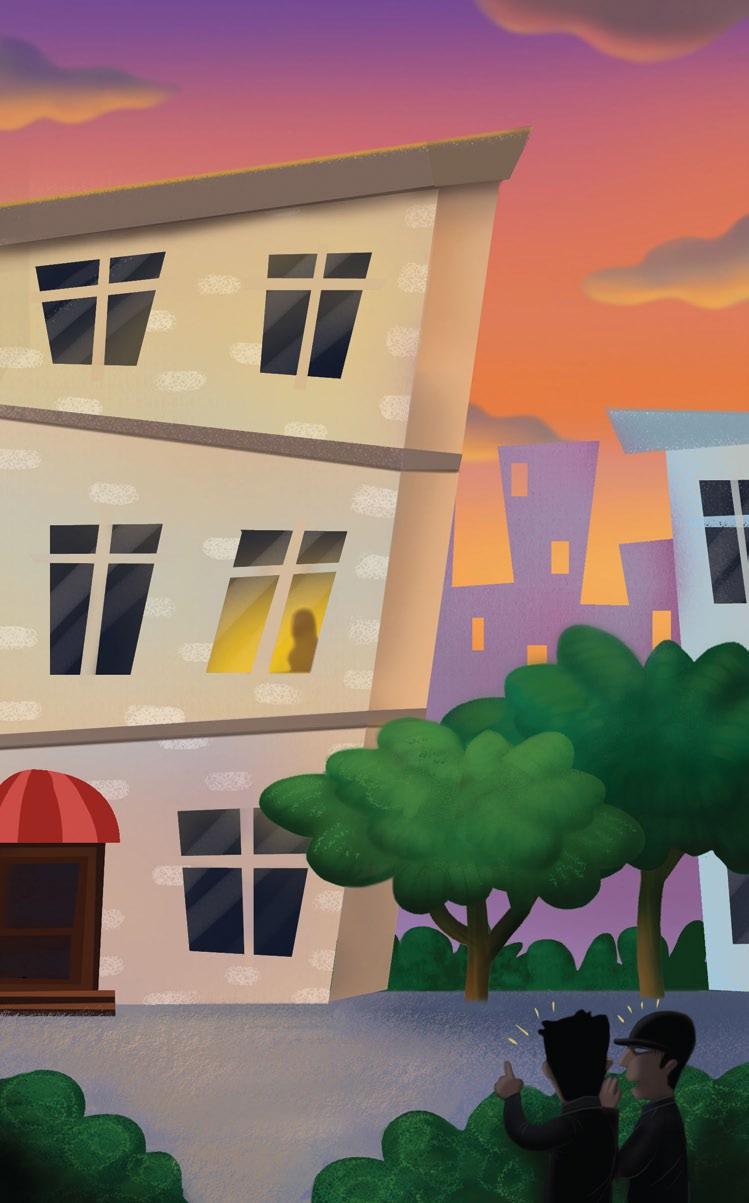
talk to you about that. And there are some people in the street near your house. I have no idea what they’re up to. That also may be nothing to worry about, but better be safe than sorry.”
“What sort of people?” May asked. “What are they doing?”
“At the moment, they’re taking pictures of the front door of your apartment block.”
“That’s strange.”
“It is strange. But don’t you worry about a thing. I’m right here on your street. I’ll be at your apartment quicker than you can turn the page of a storybook.”



